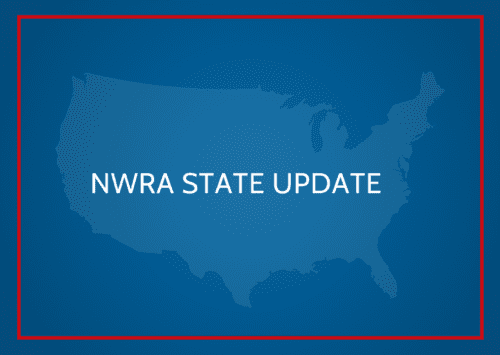NWRA State Update: Highlights from Florida’s Legislative Session
National Waste & Recycling Association (NWRA) Florida chapter lobbyist Keyna Cory with Public Affairs Consultants provides highlights from the state’s legislative session for the week of April 5.
Competing versions of the proposed budget for the coming fiscal year were discussed and voted on in the House and the Senate. The proposed House budget is $97 billion, and the Senate budget is $95 billion. Economists added $2 billion-plus to Florida’s revenue forecast, saying consumer spending and corporate earnings have far topped expectations in recent months. Powered mainly by a spike in sales tax collections, the state’s treasury should be brimming with almost $1.5 billion more than anticipated this year and another $550.8 million next year, economists concluded. Source: Sarasota Herald-Tribune
Senate Bill 50 sponsored by Sen. Joe Gruters (R-23) was passed by the House and Senate on April 8 and presented to the governor on April 12. This would require online sellers to collect and remit Florida sales tax, a move that would bring in more than $1 billion that will be used to shore up the unemployment compensation trust fund. The House added to the measure that had already cleared the Senate, inserting a provision into the legislation to cut the commercial rent tax from 5.5 percent to 2 percent in a bid to balance the new collections from online sales to blunt the notion that beginning to collect the sales tax on online purchases amounted to a tax increase. The Senate accepted the amended version of the legislation later on Thursday. Republicans in the legislature have argued the proposal isn’t a tax increase. The bill sets out a mechanism for having online retailers collect and submit the tax. Source: Florida Politics
The Florida Senate approved a bill on April 7 that would make permanent a move that has allowed restaurants to sell alcoholic drinks with take-home meals during the COVID-19 pandemic. The Senate voted 38 to 2 to approve the measure (SB 148) sponsored by Sen. Jennifer Bradley (R-Fleming Island). The dissenting votes were cast by Sen. Lauren Book (D-Plantation) and Sen. Audrey Gibson (D-Jacksonville). Gov. Ron DeSantis issued an executive order last year that allowed what has become known as “alcohol to go” as a way to help restaurants that were forced to scale back operations in the early stages of the pandemic. The bill would make that practice permanent. It would cap individual alcohol container sizes at 32 ounces and require motorists to place drinks in locked compartments, vehicle trunks or in areas behind the last upright seats in vehicles. A similar House bill (HB 329), sponsored by Rep. Josie Tomkow (R-Polk City), is ready for consideration by the full House.
A proposed change to Florida voting laws, which is still winding its way through the legislative process, mirrors some of the provisions in the new voting law passed in Georgia. Now, critics are wondering if the economic consequences Georgia has faced would be similarly mirrored if Florida moves forward with the legislation. The bills (Senate Bill 90/House Bill 7041) would limit access to ballot drop boxes and require vote-by-mail applications every election cycle, thus requiring voters who signed up for mail ballots in 2020 to reapply to receive them in 2022. Like Georgia’s law, the House proposal would block groups from handing out water to voters in line at polling places. Since the law went into effect in Georgia, the large organizations have pulled their business—over the weekend, Major League Baseball decided to move its All-Star Game from Atlanta. But Florida Republicans say they won’t bow to “cancel culture.”
In the House Appropriations Committee, House Bill 7041 underwent an overhaul and now under proposal, supervisors could continue to use drop boxes at their offices if they are “continuously monitored in person” during regular office hours. Boxes could be used after hours only if they are secured and monitored by video. Drop boxes could be used at other locations, but only during early voting hours. The measure also would require supervisors of elections to designate drop boxes at least 30 days before elections and prohibit officials from changing or moving the boxes after they’ve been designated.
The Senate Appropriations Committee is considering House Bill 1 today, which is aimed at cracking down on violent protests by creating a host of new crimes and enhancing riot-related penalties. DeSantis began floating the idea for the legislation last year after protests throughout the country sparked by George Floyd‘s death.
Legislation hailed as some of the most robust yet to defend the coastline against sea level rise is headed to DeSantis in a proposal that would provide millions of dollars annually to communities threatened with losing ground to rising oceans because of climate change. With 1,350 miles of coastline, Florida is among the most vulnerable places on earth amid the global fight against rising atmospheric temperatures. Without debate, the Florida House on April 8 unanimously approved legislation already advanced by the Senate that would establish a fund providing up to $100 million annually for so-called resiliency projects.

